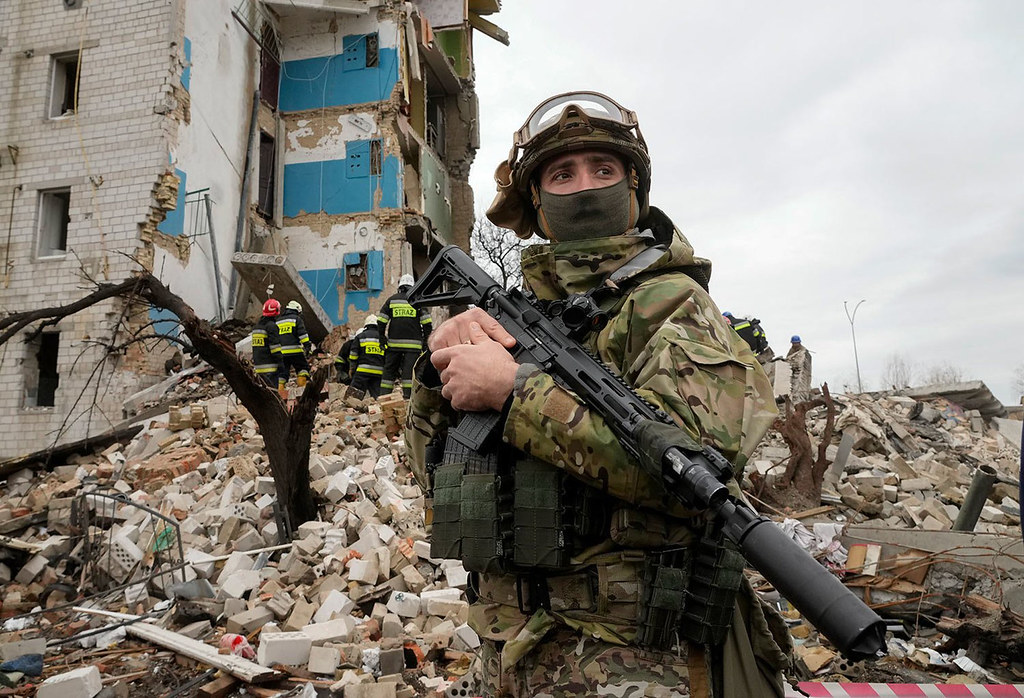
The war in Ukraine began in February 2022. I learned about the conflict while serving time in a federal prison in Alderson, West Virginia. I caught real-time updates by watching a silent television from the doorway of the common room and reading days-late deliveries of the Wall Street Journal.
The war continued to rage on and has continued since my release. My understanding of the conflict has evolved now that I have more access to media coverage. I remember watching a CNN broadcast on the weekend before Ukraine’s Independence Day, which is August 24, 2022. Ukraine’s military leadership warned citizens about “particularly ugly” Russian attacks but they also reminded the world that despite the war, life in Ukraine had continued as normal. The economy had not collapsed, children were still attending schools, and citizens were still living their lives.
Less than two months later, Ukrainian forces began to reclaim major cities from Russian troops. And then, Russian initiated a devastating attack on Ukraine’s civilian infrastructure. Russia’s targeting of nonmilitary targets has been going on for over a month and the civilian death toll continues to rise. According to Human Rights Watch, Russia’s attacks are “unlawful”.
Rules of War
The “rules of war” were established during the Geneva Convention in 1864. These rules have been updated regularly over time. The current versions prohibit attacks on civilian targets such as schools, apartment buildings and hospitals. International Humanitarian Law prohibits attacks on bystanders like women, children, elderly and the disabled. With respect to Russia’s bombing of Ukraine, the Helsinki Commission has documented these actions as war crimes.
That’s not the worst of it. An October 2022 United Nations report cited accounts of rape and torture by Russian soldiers occupying Ukraine territory. Journalists have documented various mass gravesites, at least one of which included bodies of children. Russia’s destruction of Ukraine’s energy infrastructure, which is likewise unlawful, has left hundreds of thousands of Ukrainian citizens without heat in the face of frigid winter temperatures. On November 23, 2022 Russian bombings claimed the life of a newborn. How far is too far?
There is an abundance of evidence that Russia has violated the rules of war. For months, activists, journalists, international bodies and world leaders criticized Russia for violating these international expectations of human decency. Yet, Russia’s aggressive tactics intensify and the criticisms bring no consequences.
Resisting Psychic Numbing
Psychic numbing causes individuals to feel indifferent to the suffering of large numbers of people. Some researchers have found despite learning that thousands of people have died during a conflict, these shocking statistics do not move people to act. People are not moved by the enormity of a humanitarian crisis. They are moved when they hear the gruesome details surrounding one person’s suffering. As the number of victims increases, human empathy decreases.
One explanation for this phenomenon: the world’s problems seem too big to be solved by one person. Another explanation: people don’t know what to do to intervene in a large-scale crisis like war. That’s understandable. America is 5,000 miles away from the site of the conflict. It’s hard to see how one can influence how Russia chooses to engage in warfare.
Thankfully, not everyone experiences physic numbing. In response to the war in Ukraine, Americans have made donations and sponsored refugees and asylum seekers. These kind acts demonstrate a sensitivity to the suffering endured by those directly impacted by the war. This sensitivity engenders compassion, or the desire to relieve someone else’s pain.
Compassion gives rise to other positive emotions – like sympathy and empathy. In a beautiful display of compassion, sympathy and empathy, people across the state of Maine have decided to fly Ukrainian flags. To explain their solidarity with the people of Ukraine, one man said, “We understand the injustice that’s going on over there and we want to show our support to the Ukrainian people”.
Shared Humanity
When we choose to be compassionate, we choose to recognize the humanity that binds us together as a society. Demonstrating compassion towards others shows we understand the fragility of our human existence. Being compassionate means we are more likely to recognize other people’s emotional experiences, even if we have never experienced a similar situation. It reflects an appreciation that another person’s suffering could one day be our own.
Being compassion is also good for you. Compassionate people are more likely to be kinder and more supportive to each other in times of need. Behaving this way towards other human beings associated withincreased happiness, reduced stress, and better health outcomes.
As the war wages on in Ukraine, death tolls rise, and innocent Ukrainians suffer. This post is a call to respond to the conflict in Ukraine with compassion.
Responding with compassion means we attempt to understand what it must feel like for families to be torn apart; mothers to lose their children and children to lose their parents. We put ourselves in the position of a Ukrainian citizen. Feeling compassion for those impacted by the conflict allows us to imagine what it feels like to suffer from lack of access to food, medical treatment, water and electricity and confront the harsh realities of a long, dark, cold winter.
When I imagine what it must be like to live in Ukraine today, two things happen. First, I am filled with an overwhelming sense of gratitude for my current condition. I am thankful that I do not wake up each day wondering if today will be the day that I die or that someone I love dies. Second, I become more aware of the human suffering taking place in my own community.
Global Compassion, Local Action
While there is no civil war in America, poverty, violence, and addiction have left many in Philadelphia without access to basic resources, wondering if they will live to see another day. Unlike the suffering in affecting Ukrainians, the suffering of my fellow Philadelphians is something I take action to impact. The compassion I feel for the human suffering of Ukrainians leads me to take action in my own community by donating time with local nonprofits, contributing to collection drives, and using my platform to raise awareness and encourage action.
Even though we feel we can do little to stop the violence ravaging Ukraine, we should resist the tendency to become psychologically numb to the human suffering the war has created. Rather, we should use our understanding of those events to practice being more compassionate towards others. Compassion will lead us to do things to protect our shared humanity.
Then, as Marcus Aurelius said, we “rise to do the work of a human being”.
